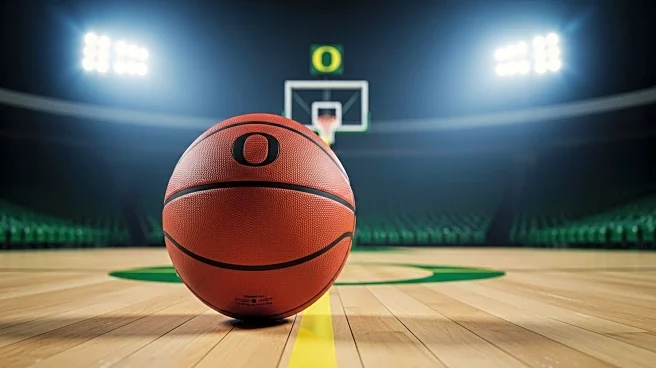What is the story about?
What's Happening?
Tajh Ariza, a top-25 basketball recruit and son of former NBA veteran Trevor Ariza, has announced his commitment to the University of Oregon. Ariza, who is ranked No. 24 in the SC Next 100, chose Oregon over USC after a competitive recruitment process. He had previously canceled a visit to Kansas and removed Kentucky from his list of potential schools. Ariza cited the opportunity to earn playing time as a freshman and the connection with Oregon's coach, Dana Altman, as key factors in his decision. Ariza is known for his skill set, including shooting, ballhandling, and passing, and is considered a potential point forward due to his vision and accuracy.
Why It's Important?
Ariza's commitment to Oregon is significant for the university's basketball program, as he is the first top-25 recruit for Coach Dana Altman since 2023. His decision could influence other high-profile recruits, such as Tyran Stokes, who is considering Oregon among other schools. Ariza's presence on the team is expected to enhance Oregon's competitiveness in college basketball, potentially attracting more talent and boosting the program's profile nationally. This development also highlights the ongoing dynamics in college basketball recruitment, where personal connections and program promises play crucial roles in decision-making.
What's Next?
Ariza's commitment may impact the recruitment of other top prospects, including Tyran Stokes, who is considering Oregon, Kentucky, Kansas, and USC. As Ariza joins Oregon, the program will likely focus on integrating him into the team and leveraging his skills to improve their performance in upcoming seasons. The recruitment landscape may shift as other players observe Ariza's decision and consider Oregon as a viable option for their college basketball careers.
Beyond the Headlines
Ariza's decision underscores the importance of personal relationships and program fit in college recruitment. His connection with Coach Altman and the promise of playing time were pivotal in his choice, reflecting broader trends where athletes prioritize development opportunities and coaching relationships. This could lead to a shift in how programs approach recruitment, emphasizing personalized engagement and clear pathways for athlete development.














